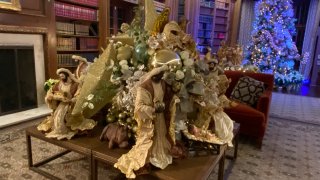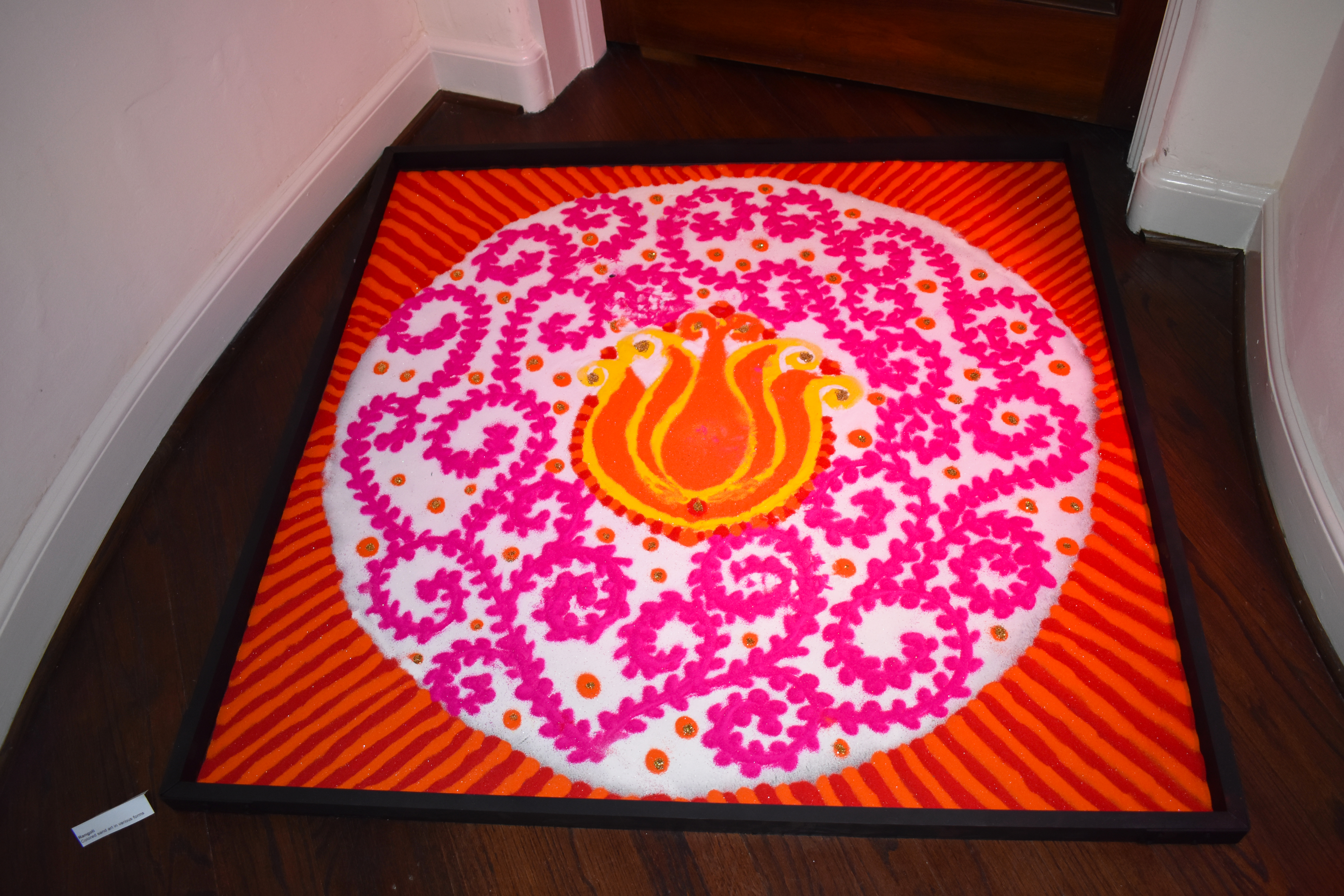
Christmas is only one of the holidays on view at the Dallas Arboretum’s DeGolyer House.
All the world loves a celebration. The Dallas Arboretum’s DeGolyer House has been transformed to showcase the traditions of Christmas, Hanukkah, Shabbat, Kwanzaa, and Diwali in The Artistry of Faith and Culture, a new exhibition now on view through December 31 as a part of the botanical garden's Holiday at the Arboretum.
Michael Hamilton, the DeGolyer House designer, has decorated the house for 24 years and was challenged to create something unifying. Working with community partners, Hamilton crafted a multicultural celebration of the festive. As the exhibition came together, Hamilton recognized a significant commonality.
“The one thing that was a common denominator was God. I knew then we would have a home run,” Hamilton said.
The DeGolyer House’s hallway features Diwali, one of India’s most important festivals of the year. Best known as the festival of lights, it was celebrated earlier this year from October 21 – 26. The five days of Diwali are marked by prayer, feasts, fireworks, family gatherings, and charitable giving centering on traditions.
Get top local stories in DFW delivered to you every morning. Sign up for NBC DFW's News Headlines newsletter.

Rangolis, designs made on the floor out of colored sand, powder, rice or flower petals, are bursting with the holiday’s bright colors. The vibrancy of Diwali was a revelation to Hamilton.
“I was in my box, in my lane,” Hamilton said. “I didn’t know what their customs were, what their celebrations were and learning that – eye opener.”
Local
The latest news from around North Texas.
The living room features Kwanzaa, created by Maulana Karenga during the 1960s civil rights era when the African American community wanted to reclaim their culture and identity.
“We didn’t really know much about our history and heritage,” said Lucy Houston, Ed.D, CEO and Educational Consultant, Learning In A Cultural Context, LLC.
Kwanzaa is celebrated one day after Christmas through January 1. The holiday gets its name from the word Kwanza which means “first fruits” in Swahili. Kwanzaa emphasizes seven principles: unity, self-determination, collective work and responsibility, cooperative economics, purpose, creativity, and faith.
“To have a holiday that African Americans can come to and do like all other holidays because all holidays have an object of reaffirming your faith principles and who you are,” Houston said.
The room is filled with large statues, wood carvings and lots of African textiles.
“Africans have a way still of putting their beliefs and values in the clothing, in the furniture, in the jewelry, in everything,” Houston said. “And you see how it connects to a lot of our cultural ways that we’ve developed.”
This holiday is designed to inspire the next generation to embrace their heritage.
“It’s especially a focus for the children so they can grow up with the concept of who they are, what their roots are and get a sense of direction for the future, for their lives,” Houston said.
When Kimberly Kort, President of the Texas Jewish Arts Association, first discussed collaborating with the Dallas Arboretum, she envisioned something modest. Instead, two rooms, the house’s morning room and dining room highlight Shabbat and Hanukkah.
“It’s been even more than imagined,” Kort said.
Shabbat, or the Sabbath, is the most important holiday in Judaism. Celebrated weekly at the sunset on Friday and lasting through Saturday night, Shabbat commemorates the day God rested from creating the world and is considered a day of peace and holiness.
“I hope people take away from this a better understanding of how the Jewish community celebrates, how we take time on the Sabbath to really not do anything at sundown on Friday night for 24 hours and give ourselves rest, and peace, and community, and prayer,” Kort said.
Hanukkah is a festival of lights, celebrating the victory of the Maccabees over the larger Syrian army. A single bottle of oil miraculously lasted for eight nights. This year, it starts at nightfall on Dec. 18 and ends at nightfall on December 26.
Following recent antisemitic incidents, Kort hopes this exhibition will foster understanding and compassion.
“Having the exhibition of Hannukah and Shabbat, especially during these times in our country, shows people what we celebrate, how similar we are, how similar Kwanzaa and Hannukah are to each other. It’s all a celebration, a festival of lights, bringing people together, peace and tranquility,” Kort said.
The sitting room features more than 40 Black Santas and Christmas fills the library, sitting room and bedroom. As visitors explore the house, they are encouraged to ask questions.
“I hope people take away, ‘Hey, that’s different. I saw something different in an exhibit that sparked my interest. I want to go investigate it. I’m not scared of it being different,’” Hamilton said.
There is something for everyone to discover about these cultures and the holidays that are celebrated throughout North Texas and around the world.
“I hope they will take away a new understanding of African culture and history, of African American culture and history because sadly, there’s been a narrative that has excluded us or under-represented us in history and even misrepresented Africa and the relationship with European countries and the rest of the world,” Houston said.
“We want the Dallas community and beyond to see that we’re all coming together and breaking bread together and celebrating,” Kort said.
“It just brings out a whole different demographic of people out. Why would you want to come out if it’s just Christmas? But now, I can go see Kwanzaa. I can learn about Hannukah. I can see what Diwali is like,” Hamilton said. “I hope it starts a conversation.”
Learn more: Dallas Arboretum

